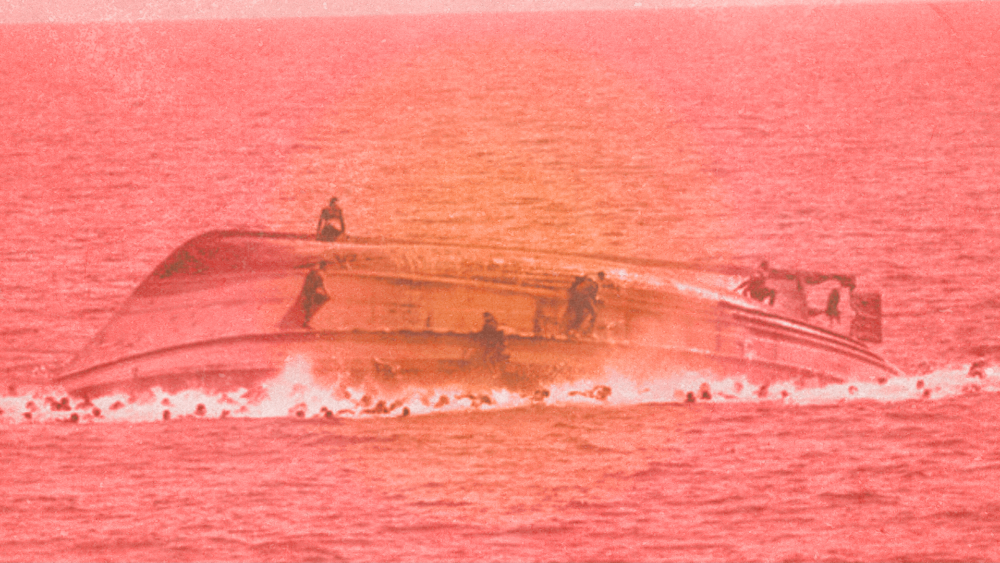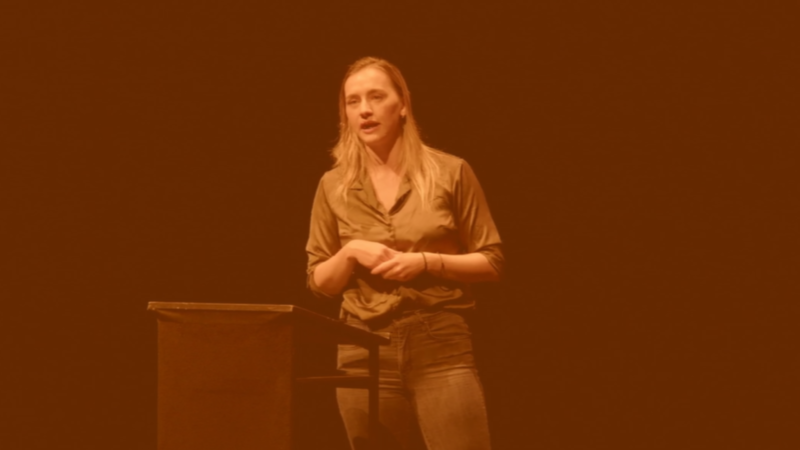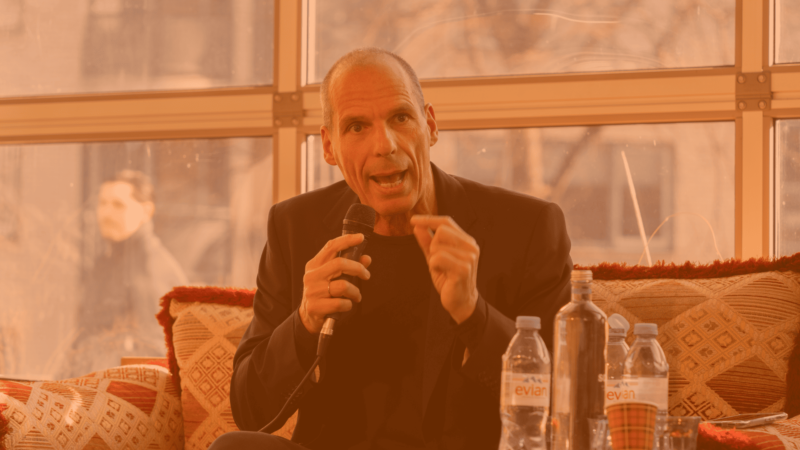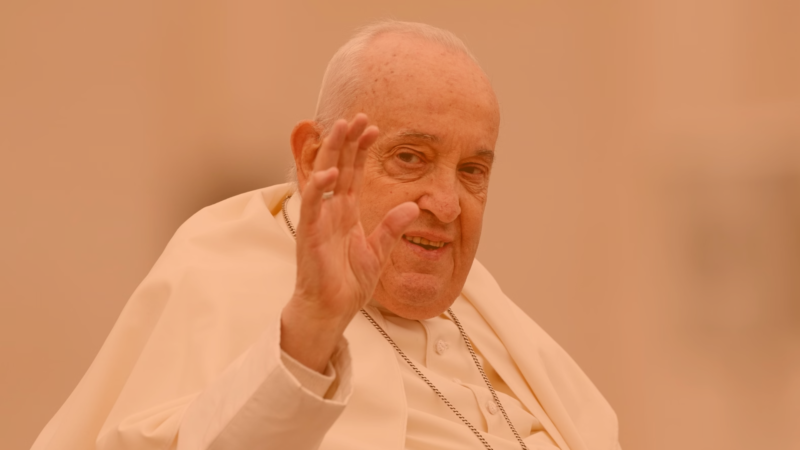The latest disaster in the Mediterranean must serve as a turning point in EU migrant policy. Last week saw one of the worst shipwrecks of recent times on the world’s deadliest migratory route. With an estimated 750 onboard, 78 people have officially been declared dead despite there only being 104 survivors.
The fishing trawler, en route from Libya to Italy, capsised and sank 80 kilometres from Greece while being surveilled by Frontex, and shadowed by the coastguard and private vessels, which provided the only known assistance. The reporting is conflicting and confusing: did the ship refuse help or were distress calls made and relayed to the authorities? What help was offered? Did those aboard know Greek forces have a history of shooting, beating and abandoning migrants at sea? Did the Greek coast guard actually cause the shipwreck? Was it their duty to rescue people in distress at sea without delay?
We know most people on the ship, and most others attempting the crossing are from former European colonies that have never fully recovered from the experience and are currently suffering authoritarian misrule, climate emergencies and war. Whether or not they are fleeing state persecution, they are seeking better futures and the EU has failed to provide them with safe and legal routes to entry.
We also know nine Egyptian men have been arrested and will be charged with mass murder. Political, media and public focus will turn to human trafficking, pursuing criminal gangs and further externalisation. Somehow, the over 2,700 people who died attempting the same crossing in 2022, and the estimated 1,039 who drowned earlier this year have already been forgotten.
Amidst the public outcry, politicians have entered a period of performative mourning, suspending campaigns, issuing empty declarations regarding further scrutiny, investigation and a search for survivors who will never be found.
The real problem is EU policy: it is deadly for migrants and unfair for countries of first entry, most often Italy and Greece, where most asylum applicants are still being returned. The financial support they receive is a fraction of what they spend and current operational cooperation does not make up the difference. So they delay search and rescue operations and obstruct NGO rescue vessels. Italy severely restricts disembarkation and impounds rescue ships, Greece illegally pushes people back to Turkey. Frontex’s budget has risen 2,763 percent since 2006. Under arms industry influence, the EU is proposing tripling funding for borders, migration and asylum (to €9.3B) now aligned with defence under the overhauled collective security agenda.
Overall, the EU is moving to differentiation with more Member States failing to uphold the right to asylum and weakening access to fair and full determination procedures. They continue to build fences at land and sea borders, conduct pushbacks and make relocation almost impossible. Across the EU inadequate reception is harming health, preventing social participation and undermining the effective exercise of the right to asylum.
The ‘non-system’ in which low wage agricultural, industrial and service jobs are performed by a mix of regular and irregular migrants remains in place. With their qualifications unrecognised and facing language barriers, even the highly educated are trapped by precarious working contracts.
Worse may still lie ahead. In April, the European Parliament approved the New Pact On Migration And Asylum, clearing the way for MEPs to negotiate the final laws with EU ministers by April 2024, just before European elections. Its main elements are externalisation, border hardening, detention, swift removal and criminalisation. Though its key buzzwords are shared responsibility and solidarity it keeps the first state of entry responsibility criterion and extends it to include people disembarked after a search and rescue operation. Claimants have no choice, they must apply in the first MS they enter, remain while their status is determined and, post-transfer, lose benefits if they leave.
Border states have new duties detaining all irregular migrants for five days (or 10 in crises) during pre-entry screening after which they will be assigned an asylum procedure (in the EU or at the border), be channelled into return procedures (in the EU) or be refused entry and returned without the right to appeal or other legal safeguards. Pre-screening will also apply to irregular migrants already living in the EU, who can be arrested and detained for 3 days without legal aid or the right to contact anyone. Frontex will expand to become the operational arm of the deportation policy.
If a migrants’ claim is still in progress after 3 months (or 10 in crises), they’ll be allowed to enter the EU but may go through 3 responsibility determination procedures and two transfers before being granted an asylum procedure. If rejected, they’ll be detained for up to three months during the return border procedure. After that they’ll be detained in the EU under the Return Directive for up to 18 months. They will not have the right to judicial overview, nor access to lawyers or humanitarian actors operating beyond the border.
Looking beyond detention, the New Pact further erodes the individual right to asylum by introducing different standards for border procedures based on country of origin. It ignores national legislation of over half of MS that provides for other protection measures (on medical, family or humanitarian grounds) granting residency permits or regularisation procedures. It also denies the needs of children: only unaccompanied minors must be adequately protected and have their best interests considered.
Now is the time to oppose this legislation. Migration is in Europe’s interests. Instead of criminalising migration, we need a humane policy that provides safe and legal paths to entry based on the EU Charter Of Fundamental Rights, which includes the right to request asylum. We must stop the shameful loss of lives in the Mediterranean and for that we need a fair, human rights based, accessible and well-funded system with true solidarity and shared responsibility.
Do you want to be informed of DiEM25's actions? Sign up here















